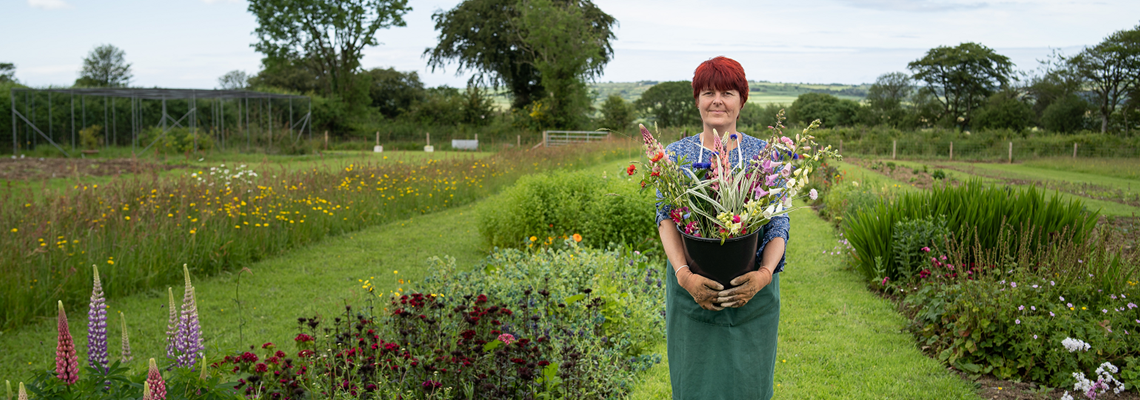#BritishFlowersWeek - Is the 'Grown not Flown' trend catching on?
Thursday, 12 September 2019

This week is a celebration of all things British Flowers, from cut flowers, plants and foliage to the growers and the independent florists working with them. #BritishFlowersWeek is now in it’s 7th year, after being established by the New Convent Garden Market to promote the industry.
Last year, the hashtag #BritishFlowersWeek was seen by millions of people on social media, reaching 12.7 million people on Twitter and 2.4 million on Instagram. There were around 6,500 posts from 3,500 different people using the hashtag. The press also got behind British Flowers Week with coverage in regional, trade and national media1.
'We created British Flowers Week to show support for independent florists and growers to raise awareness of the magnificent calibre of flowers that can be found in Britain and to inspire people to buy more home-grown blooms.' says Alastair Owen, head of communications and marketing at New Covent Garden market.
To mark #BritishFlowersWeek 2019, Co-op have become the second supermarket to sign the NFU Plants and Flowers pledge, joining Aldi in assuring fair treatment of all suppliers in accordance with the Groceries Supply Code of Practice to British growers2.
NFU President Minette Batters said: "We are delighted that Co-op has signed the pledge which supports and protects British growers and recognises the efforts they make to produce high quality produce.
But how is the industry performing?
Last year we shared our industry insight on the British cut market industry: Grown not Flown. Which focused on the key messages from the NFU report ‘Backing British Blooms’ launched in 2016, and on the #GrownNotFlown campaign. A year later, we have another look at the market and what this means for Welsh growers.
The Agriculture in the United Kingdom 2018 report calculated that UK cut flowers in 2018 had a production value of £121m versus a total value of £860m (the total is worked out as: UK flower production plus cut flower imports minus cut flower exports). It also found that in 2018 14% of flowers sold in the UK were home-grown (based on value)3.
In contrast the 2016 NFU report, Backing British Blooms4, which estimated the value of UK cut flower production in 2015 at £82m, which equated to 12% of flowers sold in the UK. This shows a rise in the number of British cut flowers sold in the UK, which could be down to the increasing consumer awareness surrounding the environmental impacts of imported flowers – it is estimated the average bouquet on Valentine’s Day travels 4365 miles and the carbon footprint of imported flowers is around ten times that of home-grown cut flowers. Just as with food, people are increasingly demanding more locally grown produce.
Market snapshot
-
UK cut flowers in 2018 had a production value of £121m versus a total value of £860m
-
In 2018 14% of flowers sold in the UK were home-grown (based on value).
- In contrast the 2016 NFU report, Backing British Blooms, which estimated the value of UK cut flower production in 2015 at £82m, which equated to 12% of flowers sold in the UK
- In 2017, cut flower imports were £745m and UK production was £130m. In 2016, imports were £748m and UK production was £93m.
- About 90 per cent of cut flowers are imported
- Research has indicated that the carbon footprint of imported flowers is around ten times that of home-grown cut flowers.
- Florists draw the majority of their revenue from the sale of arranged cut flowers. This segment is expected to generate 55.1% of revenue in 2018-19.
- This represents an average spend per person per year of £36 (£28 on flowers and £8 on plants).
- In the UK we spend £9 on cut flowers for every £1 we spend on indoor plants5.
So, what does this mean for Welsh flower/plant growers? The key messages remain…
- Think about your marketing messages – do you have a strong “Grown in Wales” message?
- If your flowers/plants can be used as ingredients in food or drink products, find local producers who can use your flowers/plants to make an even stronger locally sourced statement.
- Think about pooling your resources – could you work with other Welsh growers to offer a wider selection of locally grown flowers or plants to potential customers? Or could you share logistics or input costs to help improve margins?
- Make use of social media as a shop window, to promote and educate customers about the quality of Welsh grown flowers in comparison to imported flowers. Platforms such as Instagram are also great for showcasing what can be achieved with your flowers, such as arrangements etc... Facebook and Twitter can also be great to share your story, or to showcase any environmental credentials you may have.
- Keep an eye on upcoming trends in colours, varieties and growing methods to ensure that you can plan for the future, and stay ahead of the game.
